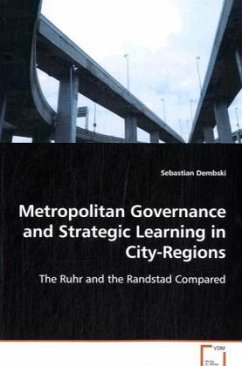The urban transformation and the increasinginter-urban competition pose new challenges forcity-regions. Cities have extended far intotheir hinterlands and the social and economicrelations within city-regions are much lessconcentrated on the urban core than some decades ago.In fact, most cities have become regional. This posesnew coordinating challenges of how to tackle therelated planning problems. It is this context inwhich strategic planning and learning returned in thedebate on urban and regional development.Metropolitan governance and the capacity forstrategic learning are regarded as essential elementsfor urban development in city-regions. Manycity-regions are in the process of formulating andimplementing spatial strategies as response. Newpolitical arenas have emerged in the processes.However, the development of such urban strategiestakes place in an arena with difficult actorconstellations under institutional constraints. TheRuhr in Germany and the Randstad in the Netherlandsare two exemplary city-regions searching for new waysto respond to these challenges.
Bitte wählen Sie Ihr Anliegen aus.
Rechnungen
Retourenschein anfordern
Bestellstatus
Storno

